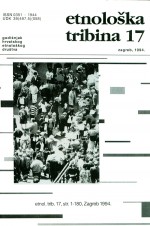Božićni prijepori
Christmas Controversies
Author(s): Dunja Rihtman-AuguštinSubject(s): Christian Theology and Religion, Customs / Folklore, Cultural Anthropology / Ethnology, Transformation Period (1990 - 2010), Post-Communist Transformation
Published by: Hrvatsko etnološko društvo
Keywords: Christmas; Croatia; popular culture; customs; ethnology; Santa Claus;
Summary/Abstract: The cultural and political context of Christmas, the most important feast in the Croatian popular culture, has been changing during the last five years (1989-1993). In the age of socialism Christmas was veiled by silence and repression. Its symbols have been deliberately transferred to the New Year, within the construction of a new, socialist devoutness. The celebration of the birth of Jesus Christ in the political situation after 1989 contributed to a new concept of Christmas rituals as a conquered human right It also became obvious that Christmas has been a topos of Croatian (catholic) identity. Since the Serbian Orthodox Church never accepted Gregorian calendar, the two dates for Christmas celebration (25.12. by Catholics; 7.1. by orthodox) gained strong symbolic value as ethnic boundaries between Serbs and Croats. Therefore Christmas as a symbol was highly estimated by the nationally oriented opposition before 1989. The post-socialist period is marked by growing political instrumentalisation of the feast. In December 1993 a vivid public discussion on styles of Christmas celebration and on new invented name for Santa Claus appeared in public media. On the other side war syndrome helped to revitalize the traditional customs of Christmas Eve and New Year’s Eve shooting, highly inadequate and dangerous in modem city life. The present author inquires the postmodern anthropological critique of “custom” as dominant ethnological concept. She is also presenting E.P. Thompson’s ideas on the role of customs in modernization as well as the study of Michel Vovelle and his approach to feasts, customs and mentality. The author is trying to understand and interpret actual Croatian public controversies about post-socialist figure of Djed Božićnjak (a newly invented tradition of Santa Claus), about “more Croat” ways of Christmas greetings and about New Year’s Eve shooting. The examination shows that actual public imagination oscillates between the Christian piety, the popular agrarian traditions and the former socialist devotion. Christmas controversies, being a part of the ambiguous battle for democracy are the indicators o f the conflict between various mentalities existing in contemporary Croatia.
Journal: Etnološka tribina : Godišnjak Hrvatskog etnološkog društva
- Issue Year: 24/1994
- Issue No: 17
- Page Range: 75-89
- Page Count: 15
- Language: Croatian

